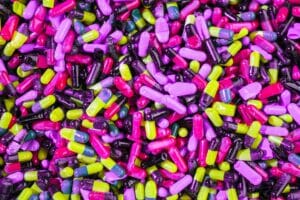As more and more people turn to natural supplements and remedies for their healthcare needs, it is important to understand how these substances interact with traditional medications. One such supplement that has garnered attention in recent years is L-theanine, a compound found primarily in tea leaves. While some studies suggest that L-theanine may have potential benefits for anxiety and cognitive function, there are concerns about its safety when combined with other medications or supplements. In this article, we will explore the interactions of L-theanine with various drugs and supplements commonly used today and provide information on what individuals should consider before using L-theanine alongside other substances.
L-Theanine and Anti-Anxiety Medications: Potential Interactions
L-theanine is a natural compound that has been studied for its potential benefits in reducing anxiety and improving cognitive function. However, it is important to be aware of how L-theanine may interact with other medications or supplements that an individual may be taking. Some anti-anxiety medications, such as benzodiazepines and SSRIs, may have combined effects when taken with L-theanine which could lead to potentially harmful interactions.
 Furthermore, certain supplements like GABA or melatonin which are commonly used for their calming effects on the body should also be considered when taking L-theanine. The research on these interactions is still limited, so it is crucial to consult with a healthcare professional before introducing any new supplement into one’s routine especially if they are currently taking medication.
Furthermore, certain supplements like GABA or melatonin which are commonly used for their calming effects on the body should also be considered when taking L-theanine. The research on these interactions is still limited, so it is crucial to consult with a healthcare professional before introducing any new supplement into one’s routine especially if they are currently taking medication.
In conclusion, while L-theanine shows promise in managing anxiety symptoms naturally, precautionary measures must be taken to avoid the risks associated with mixing this herbal remedy with prescribed medication or other dietary supplements.
L-Theanine and Caffeine: A Powerful Combination or a Risky Mix?
L-Theanine and caffeine are both natural substances that have been used for centuries to enhance cognitive function and energy levels. They are commonly found in drinks like tea and coffee, which is why they can be taken together or separately as supplements. But the question arises: Is combining L-theanine with caffeine a powerful combination or a risky mix?
Some studies suggest that the combination of L-theanine and caffeine improves cognitive performance, attention, mood, and alertness while reducing stress levels. However, the effects may vary from person to person depending on individual metabolism, health conditions or other medications being taken. Moreover, high doses of either compound can cause side effects like headache, jitteriness, insomnia or gastrointestinal discomfort.
Therefore, careful moderation is necessary when taking L-theanine with caffeine in any form including teas, supplements, nootropics or other natural remedies. Like any supplement, their benefits should always be evaluated considering scientific evidence as well as possible interactions with medication.Be cautious if you have specific medical conditions such as heart disease, bipolar disorder, and pregnancy. A professional consultation before starting any new treatment regimen is highly recommended to ensure safety. Finally, it’s important to keep in mind that these two compounds do not offer instant cures but rather potential support for daily wellness practices alongwith healthy lifestyle habits of balanced nutrition, daily exercise, and sufficient sleep.
L-Theanine and Blood Pressure Medications: What You Need to Know
L-theanine is a natural supplement that has gained popularity in recent years due to its potential benefits for anxiety and cognitive function. However, it is important to note that L-theanine may interact with certain medications or supplements, particularly blood pressure medications. Research suggests that taking L-theanine along with these medications could potentially lower blood pressure too much, leading to adverse effects such as lightheadedness or fainting.
If you are currently taking blood pressure medication and considering adding L-theanine to your regimen, it is essential to consult with your healthcare provider first. They can advise you on the best course of action based on your individual needs and health status. Additionally, if you experience any unusual symptoms after combining L-theanine and blood pressure medication, seek medical attention right away. Overall, while L-theanine may offer potential benefits for some people, safety should always be a top priority when using any new supplement or medication.
L-Theanine and Antidepressants: Possible Benefits and Risks
L-Theanine is an amino acid commonly found in tea leaves. It has been studied for its potential benefits such as reducing anxiety and improving cognitive function. When it comes to antidepressants, L-theanine may have synergistic effects and improve symptoms of depression. However, there are still concerns about interactions with other medications.
 One possible risk is combining L-theanine with sedatives or anti-anxiety medication which could cause excessive drowsiness or lethargy. Another concern is the combination with blood pressure-lowering drugs as L-theanine can lower blood pressure itself potentially causing low blood pressure and related symptoms if combined improperly.
One possible risk is combining L-theanine with sedatives or anti-anxiety medication which could cause excessive drowsiness or lethargy. Another concern is the combination with blood pressure-lowering drugs as L-theanine can lower blood pressure itself potentially causing low blood pressure and related symptoms if combined improperly.
Therefore, individuals taking prescription medications should discuss their use of L-theanine supplements with a healthcare professional prior to adding them to their regimen.
In summary, while there may be benefits from using L-Theine in conjunction with some traditional antidepressant medication, caution must be observed especially if using in combination with other drugs that induce relaxation or alter heart rate/blood pressure levels since this might lead to adverse reactions when consumed together without proper care being taken first by consulting one’s medical specialist beforehand.
L-Theanine and Sleep Aids: Can They Work Together?
L-theanine is a natural compound that has been associated with positive effects on anxiety and cognitive function. As such, it may be an attractive option for individuals seeking a more natural approach to managing their sleep issues. However, little research has been conducted specifically on the use of L-theanine as a sleep aid.
While L-theanine is generally considered safe, interactions with other medications or supplements should be carefully evaluated. For example, some studies show potential interactions between L-theanine and certain blood pressure medications, caffeine or other stimulants. As always when considering any supplement or change in medication regimen speak to your physician first about what is right for you before making changes.
L-Theanine and Herbal Supplements: Potential Interactions
L-Theanine is a natural substance extracted from tea leaves and often used in supplements for its alleged therapeutic benefits. Despite these potential benefits, individuals should be aware of the possible interactions that L-theanine may have with other medications or supplements. High doses of L-theanine can reduce blood pressure levels, so anyone taking antihypertensive medication should consult their healthcare provider before taking it as a supplement.
Additionally, those using certain herbal supplements such as valerian root or kava may experience an increase in sedative effects when combining them with L-theanine. Conversely, some research has suggested that caffeine enhances the cognitive-boosting properties of L-theanine while reducing its potential to cause drowsiness. As L-theanine becomes more widely used as a dietary supplement, it is essential to understand how it interacts with other substances and factors contributing to its clinical effectiveness and safety profile.

L-Theanine and ADHD Medications: What You Should Be Aware Of
ADHD medications are commonly prescribed for individuals who struggle with attention, impulsivity, and hyperactivity. These drugs work by altering the levels of neurotransmitters in the brain to improve focus and reduce distractibility. However, there has been some interest in using L-theanine as a natural alternative to traditional ADHD medications due to its calming effects on the brain.
While L-theanine may offer some benefits for those with ADHD symptoms, it is important to be aware of potential interactions when taking this supplement alongside other medications or supplements. Some studies suggest that combining L-theanine with caffeine can enhance cognitive function, but it may also interact negatively with certain antidepressants and blood pressure medication.
It is recommended that individuals speak with their healthcare providers before adding any new supplements or making changes to their current treatment plan. It is crucial to inform your doctor about all medications and supplements you are taking so they can ensure safety and effectiveness while managing your ADHD symptoms effectively.
In Summary:
The amino acid L-Theanine, found predominantly in green and black tea, is often used for its calming effects and to improve sleep quality. While generally regarded as safe, it’s important to be aware of its potential interactions with other medications or supplements.

L-Theanine is known to interact with stimulants like caffeine, possibly helping to moderate the stimulating effects of caffeine. This interaction can result in a calming effect, reducing stress and anxiety, while enhancing the positive aspects of caffeine such as increased focus and alertness. It’s also thought that L-Theanine may help reduce blood pressure, which could lead to potential interactions with blood pressure medications.
Research suggests that L-Theanine can improve sleep quality and may help with anxiety, but if you’re already on medication for these issues, it’s crucial to talk to your doctor before taking L-Theanine supplements. It’s typically safe to consume L-Theanine from tea or dietary supplements in moderate amounts, but high dosages could result in side effects.
Despite the potential health benefits of L-Theanine, everyone is different, and what works for one person may not work for another. Some people might experience the opposite effects, and it’s essential to monitor how you feel after taking L-Theanine. It’s also worth noting that the amount of L-Theanine in tea varies depending on the type of tea and brewing method.
In conclusion, while L-Theanine may offer numerous health benefits, it’s essential to be aware of its possible interactions with other substances, be it caffeine or other medications. Always consult with a healthcare provider when considering supplementing with L-Theanine, especially if you’re taking other medications.
FAQs:
Q: Is L-Theanine safe to use?
A: Yes, L-Theanine is generally safe for use. However, it is always recommended to consult with a healthcare professional before taking any new supplement.
Q: How should I take L-Theanine?
A: L-Theanine can be taken in supplement form or by drinking tea, such as green tea or black tea, which naturally contain L-Theanine. The recommended dosage for L-Theanine supplements is typically between 200-400mg per day.
Q: What are the effects of L-Theanine?
A: Research suggests that L-Theanine may help reduce stress and anxiety, improve sleep quality, and enhance cognitive function.
Q: Are there any side effects of L-Theanine?
A: L-Theanine is generally well-tolerated, but some people may experience side effects such as headache, dizziness, and gastrointestinal upset. It is important to follow recommended dosages and consult with a healthcare professional if you experience any adverse effects.
Q: Can L-Theanine interact with other medications or supplements?
A: L-Theanine can interact with medications that have relaxing properties, such as benzodiazepines, antihypertensives, and sedatives. It is important to talk to your healthcare provider before taking L-Theanine if you are currently taking any medications or supplements.
Q: What are the benefits of taking L-Theanine?
A: L-Theanine may help reduce stress and anxiety, improve sleep quality, enhance cognitive function, and reduce the negative effects of caffeine intake.
Q: What is the recommended dose of L-Theanine?
A: The recommended dosage for L-Theanine supplements is typically between 200-400mg per day.
Q: Is L-Theanine found in green tea?
A: Yes, L-Theanine is naturally found in tea leaves, including green tea and black tea.
Q: Are there any possible side effects of taking L-Theanine?
A: Possible side effects of L-Theanine include headache, dizziness, and gastrointestinal upset.
Q: Is it safe to use L-Theanine in supplement form?
A: L-Theanine is generally safe to use in supplement form, but it is important to follow recommended dosages and consult with a healthcare professional if you experience any adverse effects.



 Potential Side Effects and Precautions of L-Theanine Supplements
Potential Side Effects and Precautions of L-Theanine Supplements
